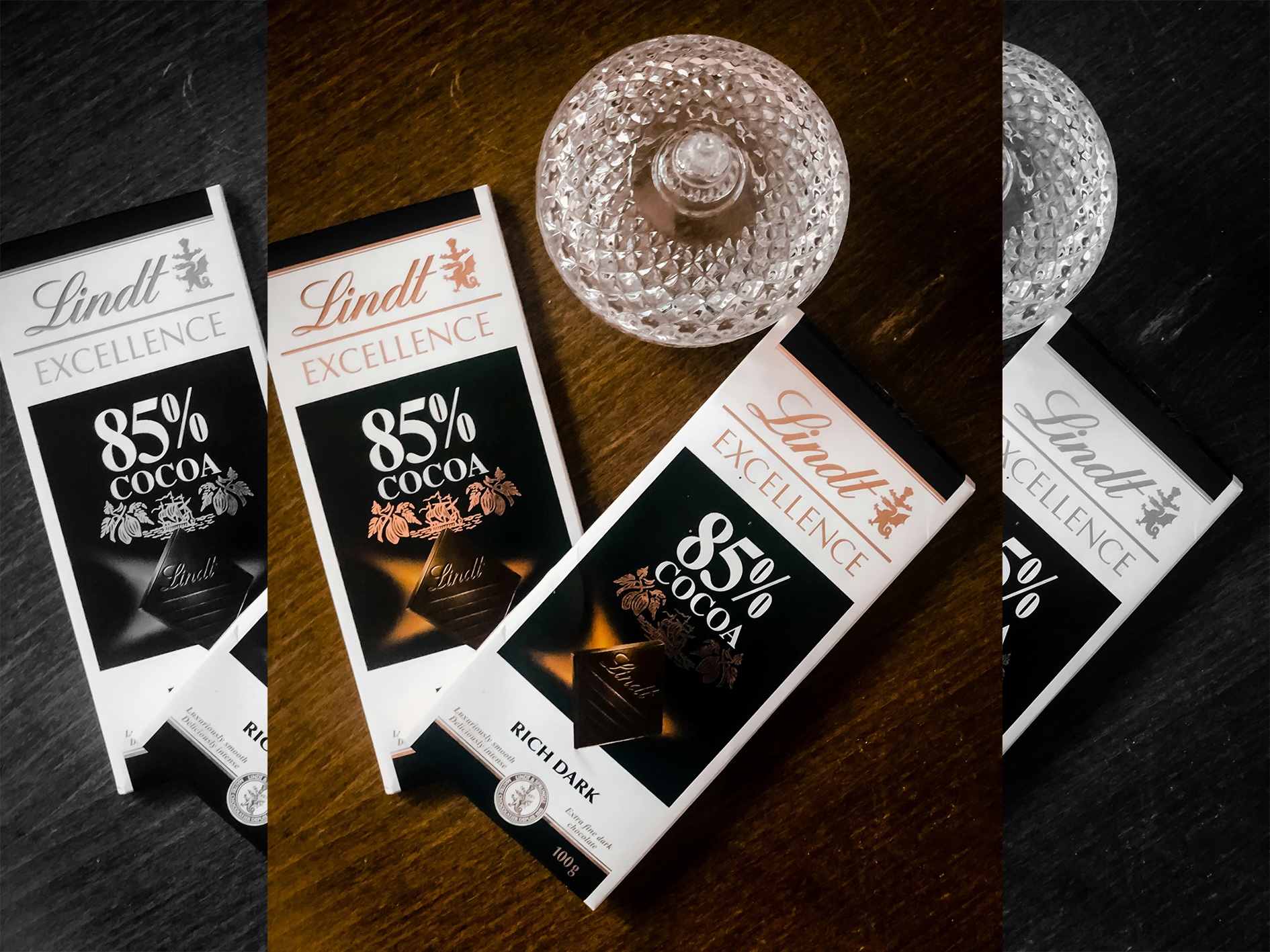It’s one of the mantras of the gourmand’s world: dark chocolate is best, and the darker the better. Not long ago, chocolate was chocolate. Only 30 years ago, milk chocolate ruled. You used “baking chocolate” in cooking. Then suddenly you had to choose between “70% cacao” and even “85% cacao”. Dark and bitter.
And who makes those? Lindt.
Modern recipes for chocolate tarts generally call for dark chocolate, whereas in decades gone by the “chocolate” component may not have been chocolate as we know it, but powdered cocoa. The same applies to desserts such as chocolate mousse.
But things are changing. Pendulums shift in both directions. And we might well ask ourselves in light of recent developments in the world of chocolate — is the pendulum swinging back? And should we help it a little?
Lindt is just better, right? More refined, more stylish, more… well, Swiss. Made, we must have presumed, with precision. Maybe even a touch of love.
Or lovingly manufactured with a liberal sprinkling of lies?
Imagine a high-flying global chocolate brand’s own lawyers saying their marketing was mere puffery, just some stuff that they made up.
And that is exactly what Lindt did. Yes, Lindt. Your 70% cacao brand. Your 85% cacao out-of-the-top drawer chocolate par excellence brand. The One. Bar None. Lindt.
As the Lindt packaging boasts, the contents within that wrapper have been “expertly crafted with the finest ingredients”. (It said so on the packaging, it must be true, right?) The inference was that we should be happy to pay more for Lindt, because it was just better.
And we believed it. Surely there was no finer chocolate, or certainly not at supermarket level. You’re happy to pay more than you would for Cadbury or Nestlé — because it’s Lindt. Right? Because of that packaging claim, which has been perpetuated and infiltrated into society.
Then, to slither out of a bit of a legal matter, Lindt owned up — it was a lie. Mere puffery. This being a useful gamble in court, because puffery cannot be proven as fact or otherwise. It’s a baseless, vague claim.
The chocolate maker’s own lawyers said its marketing tactics were “exaggerated advertising, blustering, and boasting upon which no reasonable buyer would rely”. This astonishing admission refers directly to those very words — and Lindt now admits that their prized chocolates are not in fact “expertly crafted with the finest ingredients”.
Because there may be lead in them, or cadmium. Which, even if the levels are low enough to be harmless, is not nothing. It’s not zero. And there are experts who say that any quantity of lead is too much — especially for children.
/file/dailymaverick/wp-content/uploads/2024/11/chocolate-lindt.jpg)
There’s no denying that, collectively, we bought it. Marketers everywhere, rejoice! I fell into the trap myself, urging use of “Lindt 70% or 85% cocoa solids”.
Bloomberg Law reported that at the nub of the issue is that “Lindt & Sprüngli (USA) Inc. failed to convince a [US] federal judge to dismiss a lawsuit alleging the confectionery company’s dark chocolate bars contain significant amounts of lead and were falsely advertised as ‘expertly crafted with the finest ingredients’ and ‘safe, as well as delightful’.”
So the matter is about whether, or how much, lead or cadmium there may be in a chocolate bar, but also in part about wording, about what you read on a chocolate bar label and about the choice of words in marketing.
As the New York Post and others reported, the Swiss company “confessed (the aforementioned) in an attempt to get a lawsuit against it dismissed, but it backfired when the Eastern District of New York Court denied the effort”.
This follows a controversy that erupted in 2023 when a US consumer organisation, Consumer Reports, tested 28 dark chocolate bars for lead and cadmium. Eight of the offending chocolate bars were found to have “high” levels of cadmium, including one Lindt bar. A second Lindt bar was among a further 10 chocolate bars to contain lead. All 28 dark chocolate bars contained some degree of lead and cadmium. However, neither of the Lindt chocolates contained the “highest” levels.
Also read: Why the World of Chocolate Is in Crisis
Cadmium is a chemical element that can lead to health problems with the kidney, liver and heart. Lead intake can cause problems with the nervous system, immune system suppression, kidney damage, and reproductive issues.
However, a study published in June 2024 in Food Research International found that most dark chocolate products are safe for adults, while a small minority of those tested “may pose a slight risk” for younger children “who consume more than two bars a week”.
Health.com reported that scientists from Tulane University in New Orleans had tested more than 100 chocolate bars for “heavy metals” and found that most of them contained quantities of cadmium and/or lead that did not exceed “acceptable” levels. But… it’s not nothing.
“What we’ve found is that it’s quite safe to consume dark and milk chocolates,” lead author Tewodros Godebo, PhD, Assistant Professor of Environmental Health Sciences at Tulane University School of Public Health and Tropical Medicine, said in a press release issued by the university.
What we are left with is the knowledge that we have been misled, lied to, treated like schmucks who’ll buy anything (and hey — they’re right); that we’re fools to have fallen for the cunning of marketers.
It’s we — you and I, trusting consumers — who are the schmucks. We’re the “reasonable buyers” who, it turned out, could not rely on the veracity of what Lindt told us about their own products. A cynical ploy, a folly, a sleight of hand.
Will I still buy Lindt, and use it in recipes? I will. Will I buy it for my grandchildren? Nope.
Nevertheless, all of this brings your Food Editor to a confession: I have never lost my appreciation for good old Cadbury Dairy Milk. In fact, I think I might pop out for a slab now. DM





 (Original image by Moses Rukshan on Unsplash)
(Original image by Moses Rukshan on Unsplash)